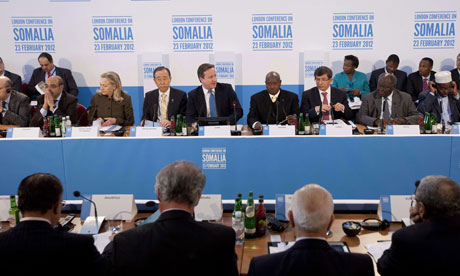Prime minister says west must help Somalis build a stable future or conflict-ridden country's problems will continue to reoccur

David Cameron opens the Somalia conference in London with a call on the international community to help the failed state to build a stable future. Photograph: Matt Dunham/AFP/Getty Images

Thursday, February 23, 2012
The world has reached a turning point in helping Somalis reclaim their country, David Cameron said on Thursday, as he opened a conference in London aimed at restoring stability to a country riven by two decades of conflict.
"Unless we can help the people of Somalia to build a stable future, the problems will keep reoccurring," Cameron told the conference.
Delegates from over 40 countries, including Hillary Clinton, the US secretary of state, and Ban Ki-moon, the secretary-general of the UN, are attending the event, the latest in a long line of international conferences to help Somalia rid its status as a failed state.
"For two decades politicians in the west have too often dismissed the problems in Somalia as simply too difficult and too remote to deal with," said Cameron. "Engagement has been sporadic and half-hearted.
That fatalism has failed Somalia. And it has failed the international community too. Today we have an unprecedented opportunity to change that. There is a real momentum right now."
The conference comes as a discredited transitional government that has survived only thanks to the support of African Union peacekeepers, Amisom, winds up in August. According to leaked versions of a draft communique, the transitional federal government (TGF) will be replaced by a "caretaker authority", that will be notionally in charge until a new constitution has been written and endorsed in a referendum, elections held and a new president, prime minister and parliament installed.
But scepticism abounds as to whether this scenario has any relation to the hard facts on the ground, where al-Shabaab, which has formally joined al-Qaida, is battling AU peacekeepers and keeping humanitarian groups out of south and central Somalia.
The UN security council on Wednesday voted to increase Amison troops to 18,000 from 12,000 as AU forces seek to keep up the military pressure on al-Shabaab after driving it out of Mogadishu. In a further setback for the rebels, Ethiopian and Somali forces captured the stronghold of Baidoa in the south on Wednesday. Ethiopian troops moved into Somalia in November but will not come under Amisom and are expected to withdraw eventually.
Increased military action, however, has complicated efforts of relief agencies in their efforts to provide food and shelter to some 2.3 million Somalis still in dire need of aid even though the famine has been declared over.
Kristalina Georgieva, the EU commissioner on humanitarian affairs, said humanitarian groups have found themselves having to deal with "multiple command points and local chiefs" in areas liberated by Amisom forces.
"Their work has become difficult," said Georgieva, who attended the humanitarian component of the London conference, adding that "military pressure has united and hardened al-Shabaab".
Clinton told the conference that the US was committing an additional $64m (£40.7m) to humanitarian assistance to the Horn of Africa, bringing total US emergency aid to the area to $934m since the start of 2011.
"As the security and political situation improves, the US will look for ways to increase our involvement in Somalia, including considering a more permanent diplomatic presence," said Clinton. "We will continue to deliver support of all kinds and to help build a broad and durable partnership with both the Somali government and people. For decades, the world focused on what we could prevent from happening in Somalia – conflict, famine and terrorism. Now, we are focused on what we can build."
Some Somalis, however, warned about the perils of intervention, particularly from Somalia's traditional rival, Ethiopia, which invaded Somalia in 2006, driving out the Union of Islamic Courts (UIC), who brought a temporary respite from the chaos that engulfed the country since the downfall of Mohamed Siad Barre in 1991.
"Yes, there is warlordism, terrorism, piracy, and a history of natural disaster," said Mohamed Sharif Mohamud, a former ambassador of Somalia and of the Arab League. "Yes, displacement, refugees and a lack of state authority are problematic. But these issues result directly from sustained foreign intervention and the deliberate fragmentation of the country into fiefdoms, enclaves and tribal territories."
Source: Guardian